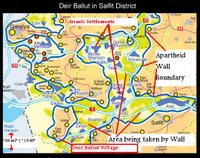
CLICK FOR A MAP of how the "Apartheid Wall" or "Separation Barrier" and nearby Israeli settlments enclose Deir Ballut village. Part of the displayed path of the barrier is still under construction (we could see the equipment working from our host's front porch). See this report on past demonstrations and resistance to the Wall's construction. Local resistance succeeded in saving some of the land that would have been lost behind the wall.
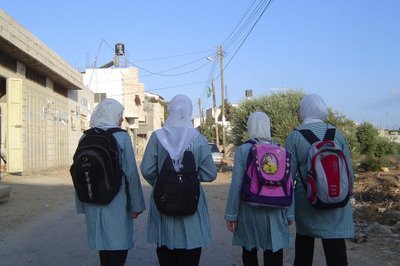
Girls on the way to the first day of School in Dair Ballut. Boys schools will soon be closed due to a teacher's strike. Palestinian teachers have been working without pay since the US-led sanctions went into effect against the Palestinian government in February. Many people are saying, "The financial crisis hurts regular people, not Hamas." Whether it hurts Hamas or not, the sanctions regime impacts the entire population's school, medical, and police services.

This boy's father is unemployed due to financial crisis and Israeli closure. I found his father to be energetic, clean-cut, and in his best working years...the traditional breadwinner of the Palestinian family (although more and more Palestinian women are working outside the home). He struggles to make ends meet from Olive trees on land that was rescued through protest from anexation behind the "Apartheid Wall" that now strangles the village.
Instead, only the grandparents provide income. The grandmother brings in some money by sewing. The grandfather works at a factory in a neighboring Palestinian village called Kfarr Qassam. Kfar Qassam is inside the 1948 border (i.e. in "Israel."). He is one of the lucky few who have permission to work inside Israel legally, (many sneak in) but he can only stay legally during daylight hours.
The trip from Dair Ballut to Kfar Qassam should take just a few minutes. Kfar Qassam is just a few miles away and is easily visible from Dair Ballut's hilltops. However, he must travel 2-3 hours on a long an circuitious route to reach the factory in Kfar Qassem. As a result, the grandfather sleeps illegally in Israel so he can be at work on time (the factory owner has set up some kind of place for the workers to sleep).

In the foreground, homes on the edge of Dair Ballut village. The bright lights behind are of Ped'Uel, an illegal Israeli settlement. The main road from the Jewish-only Israeli settlement comes from the east and the main road from the Palestinian village comes from the west. They intersect at north-south highway. There is a checkpoint there that is open from 6am to 6pm (according to Btselem). Every West Bank Palestinian vehicle must stop and be checked. Jewish settlers can pass freely 24hrs a day. The checkpoint has been on the edge of Deir Ballut for 18 years, since the settlement was built in 1988.The checkpoint is closed at night. There are many stories of ambulances being stopped after daylight hours. Allegedly, twin babies died while their ambulance waited at this checkpoint . Observing the checkpoint from a rooftop at a friends house in the village, we watched military vehicles move slowly back and forth, searching the darkness with their lights, waiting for Palestinian traffic from the village. I imagined a jailer in a prison hallway, swinging his flashlight and clinking his ring of keys.
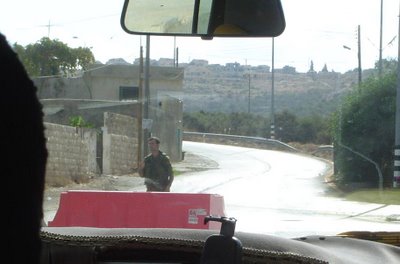
A soldier at the checkpoint on Dair Ballut's main access road, just a few hundred meters from the village.
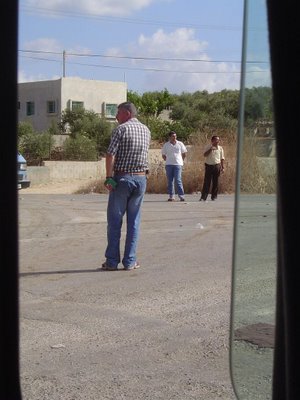
The driver of our "service" (a shared taxi, usually a van) holds our ID's. The green color is the Palestinian "Huwiyyeh," or ID card issued by the Israeli military.
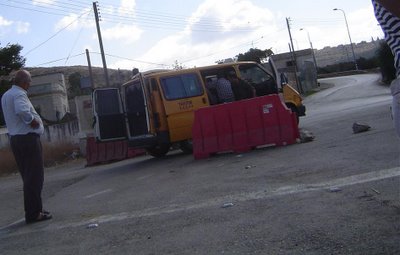
The soldier orders: "All passengers out of the taxi." We and our Palestinian commuter companions wait as our taxi is nonchalantly searched by soldiers at the edge of Deir Ballut village. This chekcpoint stops all traffic between Deir Ballut and the main highway. Traffic from the adjoining Israeli settlement passes through the checkpoint freely. Villagers from Deir Ballut work, visit family and attend Universities in nearby Palestinian cities like Ramallah. However, due to checkpoints like this one (which was established in 1988), the time for what would be a 20 minute trip varies irregularly from 1-3 hours. Most only make the trip twice a week, and rent a room or stay with family at their destination.
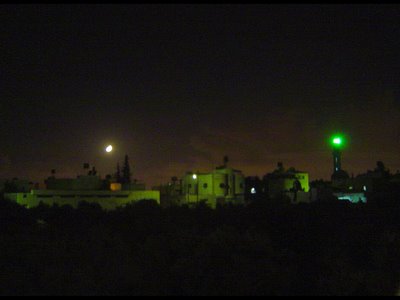
Deir Ballut by moonlight and mosque-light...
No comments:
Post a Comment